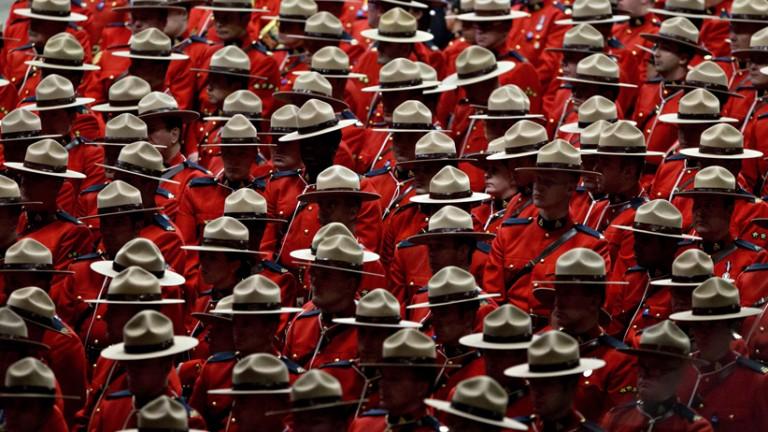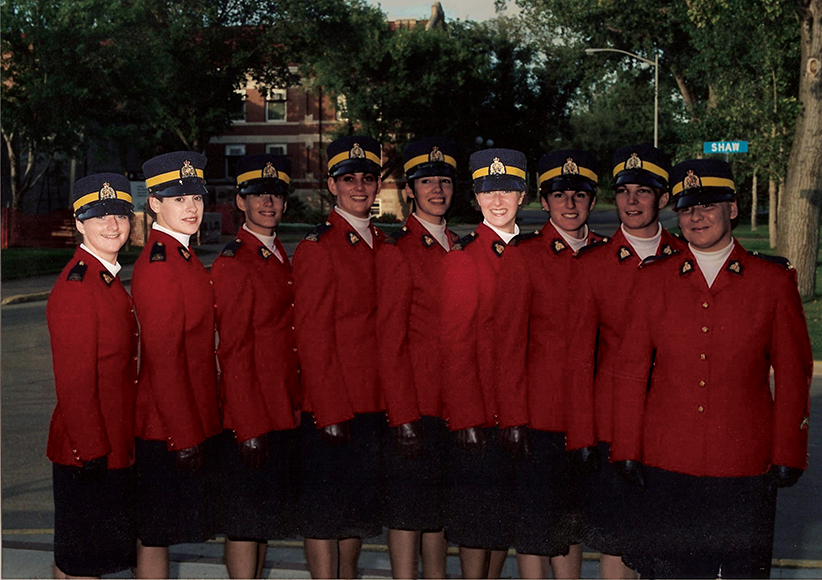Ex-RCMP officer: ‘Apology has to be backed by firm action’
A retired RCMP officer who fought back against workplace harassment talks about the force’s $100 million settlement

In mourning: RCMP officers attend the Jan. 26 funeral of Const. David Wynn, who died of his wounds four days after being shot in St. Albert, Alta.
Jason Franson/CP
Share
Sherry Benson-Podolchuk endured sexual and workplace harassment throughout her 19-year career as an RCMP officer. From her first posting in Tisdale, Sask., male officers addressed her by derogatory nicknames like “raisin tits” and “beaver.” Her objections triggered still worse abuse. One day, she opened her locker at the detachment to find a slaughtered prairie chicken, dripping blood on her belongings.
But Benson-Podolchuk fought back, retiring in 2009 with an official apology (the second she’d received during her career) and a legal settlement.
Her book, Women Not Wanted, became an inspiration for hundreds of female RCMP members who were experiencing similar treatment. Over the past five years, Benson-Podolchuk has provided advice to plaintiffs and counsel behind the class-action suit the federal government settled Thursday at an estimated cost of $100 million. As she puts it: “I spoke to them from the other side of despair.”
Now 53, Benson-Podolchuk speaks and consults on workplace conflict. Maclean’s Charlie Gillis reached her in Winnipeg.
Q: Is this a good day for women in the RCMP?
A: This is a great day. I’m so happy for the women who spoke up, because I know how terrifying it was. I did it all by myself. I remember what it was like. I remember how hard it was to get where I am today and I wish for them all to get to this place—where they can talk about it and not feel traumatized.
Q: Was Commissioner Bob Paulson’s apology adequate?
A: I don’t know him personally, so I can’t comment as to his sincerity. But it was really important for the organization and the victims—past, present and possibly future—to know that their leader is willing to apologize. Having public acknowledgement is important. Now, that apology is only good if it is backed up by action. Think of a man who beats his wife and says, ‘Sorry, I’ll never do it again’—and then does it again. That apology means nothing. This apology has to be backed by firm action in getting the payments out to victims, in enforcing policy for all officers about respectful workplaces, in stopping workplace bullying.
Q: What do you make of the settlement, with its escalating levels of compensation?
A: There is no amount of money they could have given to erase that trauma, or even come close to compensating me. Especially when it was inflicted by co-workers whose job it was to serve and protect. They didn’t protect me—they violated me. What’s more, there was nobody to help, so I felt the organization itself was abusive. But it’s true there are different degrees of pain and suffering for each victim. A trauma for me might not be one for someone else. So I think it makes sense that they are different levels.
Q: Having spoken to other female RCMP officers, what proportion do you believe experienced harassment?
A: All of them.
Q: Why have harassment issues festered within the RCMP so much longer than in other forces?
A: One, we didn’t have a union, like other police forces do. We had member representatives, but guess what? They’re in those positions for only a certain period of time, and they don’t want to piss off management. They have to go back into the organization. They don’t want to ruin their careers. There’s also too much power at the top. In my own case, it would have taken little more than someone’s signature to get rid of me. I was fortunate that, as I was going through the process, I became stronger. I figured out how to use the system to protect myself. I shouldn’t have had to do that—the rules are supposed to protect me. But when all the power is concentrated at the top, the message of who has the power filters down to everybody, and you have a broken organization.
Q: Does the force seem any better prepared to deal with harassment now than it did when you served?
A: There have been some good things. A couple of Senate inquiries, and the problem is now out in the public sphere and that’s good. There have been changes to the RCMP Act, and when people join, they are made aware that this is a problem, how to protect themselves. Ten years ago, hardly anybody said anything. The whisper [about harassment] wasn’t a roar, like it is now.
Q: But will it last?
A: Consistent change has to come from the leadership. If you’re not willing to enforce your own rules, then the message is clear to both the victims and the bullies that this is a bullies’ organization. All the fancy words in the world won’t stop harassment under those circumstances.
Q: One change to the RCMP Act has strengthened the commissioner’s power to terminate members to “promote the economy and efficiency” of the force. Harassment victims who are off-duty sick—some with PTSD—believe it’s being used to get rid of them.
A: Yes, they’re told they’re being accommodated, but they must take a certain position or they’re gone. That is a very polite way of bullying people. It’s all in the wording. There’s a difference between streamlining and eliminating people who are off-duty sick. They need to address why these people are away sick, and not send people back to where they were being abused.
Q: What would you say right now to a young woman considering a career in the RCMP?
A: Go for it, sweetie, if this is what you really want. But be informed. Be aware.
